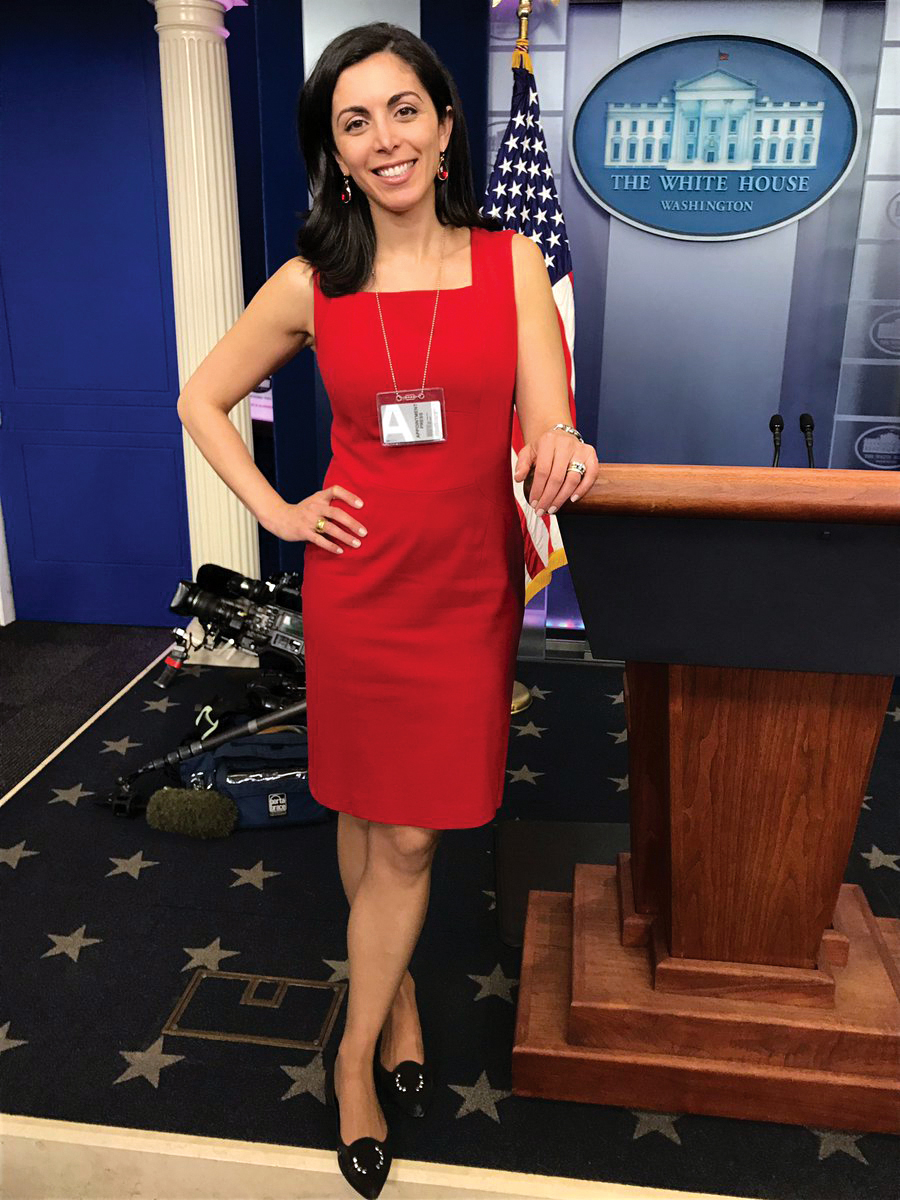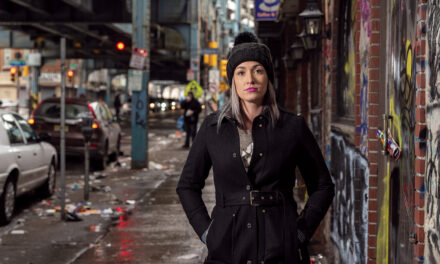Ronica Cleary spent almost 1½ years as a White House correspondent, a job she found both exhilarating and challenging. With that part of her career behind her, she’s embarking on a new journey and hoping society can be a little more open about what women need to manage career and life.
It was the Cheez-Its in the Rose Garden that did it. After months of working as a political reporter and covering President Donald Trump’s White House for Fox 5 DC, it suddenly occurred to Ronica Cleary as she was rummaging through the box for a cracker, waiting for a presidential briefing to start, that this was pretty cool.
For starters, it wasn’t where she thought she’d be in her early thirties. In fact, after getting a Masters of Science in Public Communication from Drexel University at 24, which she paid for in part with the prize money she received from winning Miss Philadelphia in 2005, she told her mom she didn’t want to go into television, at least not yet. “I learned during my internships at KYW CBS3 and Comcast Newsmakers that a newsroom is a really tough place. And sometimes there’s a difference between being tough and wanting to be tough,” says 35-year-old Cleary. “I knew after my internship that wasn’t the place for me to go next. When I told my mom I made the decision not to pursue TV after graduating, she said, ‘Are you sure?’ I just looked at her and said, ‘I’ll work in television, but this is not the right time.’ I’m glad I listened to my gut.”
Cleary was a bit of an old-soul kind of kid, understanding from an early age how to talk to adults and what was ok to say. So, she trusted her instincts, despite the fact that her pageant success, combined with hard work, intelligence, and poise in front of the camera, seemed like a natural fit for television. But her gut led her to become an adjunct professor teaching communication at Drexel before launching a consulting business called Ronica LLC, doing executive coaching and helping pageant contestants improve their skills.
But those same instincts told her that a chance meeting with a professional acquaintance was actually a serendipitous opportunity, and she quickly seized it. He told her he was starting a television show in New Jersey, eventually called Chasing New Jersey (now called Chasing News), and he thought she should audition. “The show didn’t have a studio, a host, an air date, but I quit my job. I just felt like it was a great opportunity,” she recalls. “There was an energy around Chasing New Jersey. The philosophy of the show was to change local news and the way stories are told, to be creative. We wanted to tell the news differently—to talk about stories and debate it. I was so energized about politics—I would come home from Chasing and watch Ed Henry on the evening news reporting from the White House and say, I want to do that job.”
It’s so easy for a job to become normal and to be grumpy because the trash isn’t taken out or you have to stand in the back during a briefing. You can almost forget how thrilling it is—the fact that you are part of a moment in history.


Inside the House
Cleary started covering New Jersey Governor Chris Christie soon after the George Washington Bridge lane closure scandal broke, adrenalizing the political and media world. The scandal, known as Bridgegate, involved staff members of the then-NJ governor intentionally closing lanes at a main toll plaza, which caused a hellacious traffic jam and eventually damaged his reputation.
The scandal created a backdrop to Cleary’s career that brought frenetic energy and excitement she could not have anticipated but that she gladly welcomed. “You can cover politics your whole career and cover budgets and grand openings or you can fall into a timeline where you cover Chris Christie and the 2016 presidential run,” Cleary says. “I have covered some historic events in our lifetime.”
But even at Chasing, it didn’t happen right away. One of her first assignments was covering Miss America, and although she had the experience and acumen to cover the story well, Cleary felt slighted. She wanted the opportunity to work on the Christie beat, and although she had positive experiences with pageants, that wasn’t the kind of stories she wanted to cover. “I did feel like I had something to prove initially. But I did it—I covered Miss America, and I gave it 1,000 percent. I learned how to edit, and I think I convinced my producer that I was a really hard worker and I was creative,” she says. “That ended up setting me up for covering more politics.”
Through her work at Chasing New Jersey, Cleary discovered two things. The first was that she thrived covering political races. The second was that she was completely charged from doing it. “You talk to some reporters who love to cover governing and some who love the races,” she explains. “I love the competition part of it. I loved reporting politics. Television is a space where you have 2 minutes to tell a story. I felt a sense
of honor and pride because I would cover these stories that were so vast, and I decided what was included.”
In the midst of the presidential campaign, Cleary got a call from her general manager who let her know she was likely going to receive an opportunity to work in Washington from Fox 5 DC. At the time, while her career was thriving, she and her husband, Patrick, had an infant daughter at home, so she was initially torn about what to do. She and her husband decided he would stay behind for his job, and she would bring her daughter down to DC so she could be close to her but also pursue the job of a lifetime. “It was a big decision, but it was a professional opportunity I couldn’t give up. They hired me to be a political reporter on a Sunday morning talk show called Fox 5 on the Hill,” she recalls. “We covered the 2016 presidential race. Trump won, and the news director called me at my desk and said, ‘Why aren’t you in the White House briefings?’”
Cleary set about getting her press credentials, and before she knew it, she was one of the correspondents in the briefings. It was cutthroat, and while she loved the work, she also found the political circus and everything surrounding it to be difficult to navigate at times. She says many of her peers in the media—especially in the early days of Trump’s presidency—were deliberately making themselves part of the story. “It became an opportunity for some to get a cable news spot or get a book deal,” she says.
But on the whole, the experience of covering the White House was a dream come true, even if it wasn’t something that would last forever. “My friend and I were sitting in the Rose Garden eating Cheez-Its one day. It was just wild. We looked at each other, and it was like, Can you believe we we’re sitting in the middle of this administration doing this?” she says. “It’s so easy for a job to become normal and to be grumpy because the trash isn’t taken out or you have to stand in the back during a briefing. You can almost forget how cool it is—the fact that you are part of a moment in history. I could have reached across the room and touched the President and the Vice President of the United States.”
Suit Up
Although Cleary makes an effort to stay out of the fray unless she has something unique to add to the public discourse, she shared her views after the Miss America Organization removed the swimsuit part of the competition in an article published in The Hill in June 2018. Here is an excerpt:
There is no denying that the Miss America pageant, in its most recent form, was no longer relevant. But to the tens of thousands involved in the pageant, that didn’t matter. It was a place for those who loved the glamour, loved the competition, loved the swimsuit and loved the pageantry of it all.
Now that place has been decimated in a last-ditch effort to resuscitate something that will never be accepted by those who never understood it in the first place.
I also have to wonder where it stops. The current Miss America contract (that all contestants must sign who compete at any level) requires you to be a woman. You must be a citizen. You must be single and never married (not even an annulment is permitted). You can’t have children (adopted or biological) or be pregnant. And it goes on with the vague requirement that contestants must be “of good moral character.”
If you want to be relevant, why not abandon those criteria too? Why can’t a married or divorced person compete? Why can’t a mother compete? Why can’t men compete? There is nothing gender specific about an interview and talent-based competition. How about illegal immigrants? And who are they to define morality? People will ask these questions and more now that the Miss America Organization has already abandoned so much of its identity.
I loved reporting politics. Television is a space where you have 2 minutes to tell a story. I felt a sense of honor and pride because I would cover these stories that were so vast, and I decided what was included.

Organized Chaos
While she mostly relished her job as a White House Correspondent for 1 ½ years, Cleary also found herself pulled in many directions during her time there. The rigors of the job are partly to blame, but she also found firsthand that our culture can be unforgiving for working moms. “In their efforts to tell [girls] we can do everything, I think many of our mothers did a slight disservice in not giving us a fully honest description of what it takes to be a mother, a wife, and a working professional. That has been the biggest surprise and the thing that all of us struggle with every day—what to do when you have an interview with Virginia Gov. Terry McAuliffe and daycare calls to tell you that your daughter has a fever. What are you supposed to do?” she says. “It’s not that we can’t do it, but we just need to be honest about how hard it will be. It could help our sons and daughters if we tell the truth about what it takes to pull this off.”
Cleary became pregnant with her second child and found herself nearly full term and still fighting for a seat in the press briefing room. But the challenges of being a working mom and living apart from her husband were only part of what led her to switch gears.
What led her to leave Washington, DC and her career as a political reporter had more to do with the culture of the profession at the time. Last September, Cleary wrote an opinion piece for USA Today, saying, “Reporters turn White House press briefings into performances. That’s why I quit.” While she also praised some in the room who she said she admires, Cleary wrote that during her time in the briefing room, she witnessed “The withering of a press corps that I once aspired to join.” She offered examples of incidents in which reporters’ outbursts and “gotcha questions” were rewarded with cable news contracts, promotions, and opportunities, instead of being called out for bad and inappropriate behavior.
The article took courage to write, and she did receive backlash, although some of her peers did assert their agreement with private texts and emails after the fact. Cleary headed back to the Philadelphia area and refocused her attention on her family. In the year since her son was born, she started another consulting business—Cleary Strategies, LLC—which helps corporations, political campaigns, and individuals navigate the media effectively. While she’s no longer in the thick of the action, Cleary knows she still has more to accomplish in her career. “I’m helping people navigate media and to understand a space I know intimately,” she says. “I still have great dreams and things I want to do. And most importantly, I continue to trust my instincts and my gut. That’s what feels right to me.”






